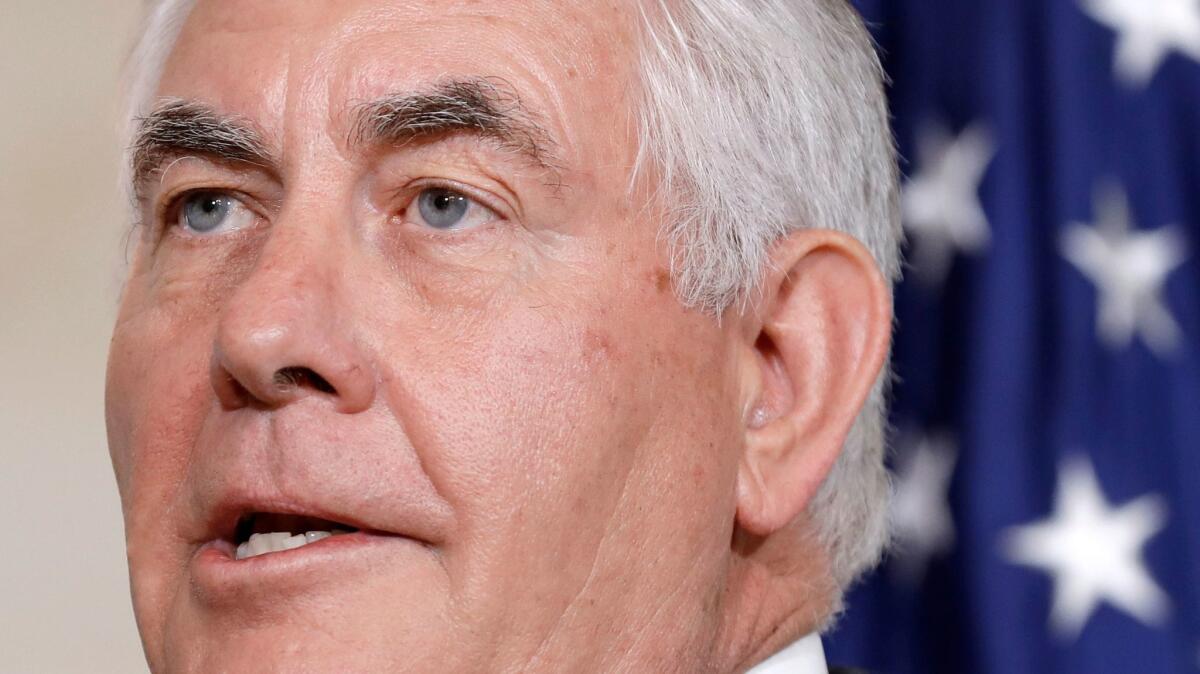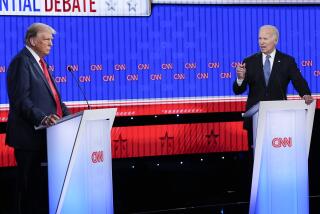Op-Ed: Did Exxon lie to its investors as well as the public?

It’s possible that Rex Tillerson has the worst job in the world. It can’t be much fun being the top diplomat for the least diplomatic president in American history — just look at the pictures of New Zealanders lining his motorcade route in Wellington this week, middle fingers extended.
But it’s also possible that it beats the alternative. Because if the secretary of State were still at his old job, running Exxon Mobil, he’d have to deal with a burgeoning corporate scandal. Late last week, overshadowed by Trump’s withdrawal from the Paris accords (which in turn caused Tillerson’s top man in Beijing to resign his post), environmental news of a different sort broke in a New York court filing.
The intrepid Eric Schneiderman, the Empire State’s attorney general, laid out the first real fruits of his investigation of the world’s largest fossil fuel company on Friday. That probe started two years ago, after news organizations including this newspaper showed that Exxon had known everything there was to know about climate change decades ago, and instead of telling the rest of us engaged in a massive coverup.
One enduring mystery of the litigation is California’s absence.
Those lies are a moral crime of incomparable consequence — they mired the world for a quarter-century in a sterile debate about the “reality” of global warming, a debate that Exxon could have ended by coming clean. But telling that kind of lie may be protected by the 1st Amendment; in the short run, anyway, there wasn’t much to do about it except try to publicly shame Exxon in an effort to hold it accountable. Some of us took on that job; I was arrested after sitting in at an Exxon station to draw attention to those articles in the Los Angeles Times and Inside Climate News.
Schneiderman took a different tack, subpoenaing the company to see if it had also lied to investors. (Since there’s money on the line, that’s called fraud, and it’s definitely not protected by the Constitution). For two years now, Exxon, with the same lawyers at its side who once defended Philip Morris, has fought his efforts, attempting to quash subpoenas and intimidate environmentalists. (I have a letter from them warning me to preserve my emails relating to Exxon, which apparently didn’t like my little protest). But Schneiderman persevered, and eventually his sharp-eyed attorneys noticed something interesting in the crateloads of documents the company has so far surrendered.
Exxon claims that since 2007 it has used a “proxy price” on carbon to decide if it’s safe to invest in new oil fields. Executives know the world is starting to take action on climate change and that national governments are likely to impose new rules and regulations on fossil fuel markets, so they predict how much extra they’ll have to pay to obtain and sell oil.
By 2040, they told investors, it would cost an estimated $60 a ton of carbon dioxide for the right to sell oil. And they assured investors repeatedly that since they’ve applied that price to their profit and loss calculations, none of their reserves would be “stranded” by climate concerns. They had stress-tested, as it were, their business plans against the political changes they knew were coming.
But Schneiderman’s trove of documents makes it appear that this was just a story for outside consumption. Internally, they were figuring in a much lower proxy price for carbon dioxide, meaning that they were taking on much riskier projects. There even appears to be an email in which Tillerson says he’s “happy” with the double accounting.
This tawdry scheme matters mightily, and not just to investors who may have lost money. It translates into great clouds of heat-trapping gas, which in turn mean drought, flood, fire. It’s evil, Big Tobacco-scale evil, except that instead of taking out one smoker at a time, the fossil fuel industry works one planet at a time.
Schneiderman deserves enormous praise for taking on Exxon, and his Massachusetts counterpart Maura Healey has shown courage too. One enduring mystery of the litigation, however, is California’s absence.
When Kamala Harris was the state’s attorney general, she announced she was joining in the probe, but she never took an active role in issuing subpoenas. Her successor, Xavier Becerra, has so far stayed on the sidelines too, a curiosity since the rest of Sacramento is hard at work dealing with climate change. Perhaps the new revelations will get his office actively engaged in issuing subpoenas of its own.
In any event, the backstory of the greatest crisis the planet faces is slowly emerging, one email and deposition at a time. Rex Tillerson’s State Department is doing its best to twist the truth about climate change. That his company apparently did the same is not a shock, but it’s a scandal nonetheless.
Bill McKibben is the founder of 350.org and Schumann Distinguished Scholar in Environmental Studies at Middlebury College.
Follow the Opinion section on Twitter @latimesopinion or Facebook
More to Read
A cure for the common opinion
Get thought-provoking perspectives with our weekly newsletter.
You may occasionally receive promotional content from the Los Angeles Times.










